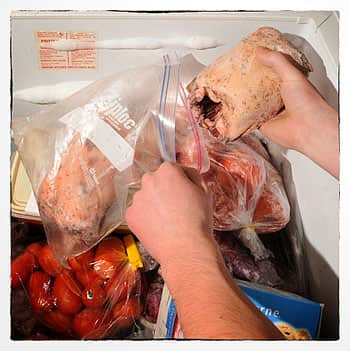Delta’s Tips for Preparing, Cooking Ducks and Geese
OutdoorHub 02.01.12

Ice-fishing with friends recently on a lake near Winnipeg, Delta Waterfowl President Rob Olson deep-fried four rice-fattened California mallards in peanut oil, a dark-meat snack to keep Old Man Winter from nipping at their extremities.
The plucked birds were rubbed in spices, injected with marinate and cooked to medium-rare perfection.
“They were wicked good,” said Olson, laughing, noting they ate the ducks off a piece of plywood with their bare hands. “The meat was moist and, frankly, I can’t remember duck tasting so good. The preparation was super easy too.”
Like many hunters this time of year, Olson has some ducks and geese in the freezer poised for the pot. He encourages other waterfowlers to prepare their birds and share them with family and friends. And don’t worry, he said, if you’re inexperienced in the kitchen.
“Just take a few birds out of the freezer and let them thaw, then start doing some research on how to prepare them,” he said. “I think the key to cooking ducks is to defrost one. Make it a habit once a week to pull out some frozen game meat. It will keep you from having a bunch of freezer-burned stuff later on.”
Above all, Olson says make the experience fun. “Cooking ducks and geese should always be a celebration, so just have fun doing it,” he said. “Just start rummaging through your freezer and find those frozen orphans and get them thawing.”
Here are some basic tips and suggestions for preparing ducks and geese:
- Thaw out your birds thoroughly before preparing. The best way is to let them thaw in the refrigerator. If you’re short on time, fill a large pot with cool water and place the still-wrapped bird in it. It should thaw within two hours. Be sure the frozen bird is properly sealed or it will get waterlogged.
- Clean your birds thoroughly. Be sure it get everything out of the cavity—everything.
- Soak meat in milk and onions overnight to pull out blood and gamey taste.
- Let meat come to room temperature before you cook it. Always pat it dry before cooking.
- Cook ducks hot and fast or low and slow.
- Roasted ducks should be cooked no more than medium-rare. Grilled duck breasts too. No exceptions.
- Let your birds rest (five minutes, perhaps longer) after they’re done cooking. Resting allows juices to redistribute and stay in the meat; cut into it too soon and you’ll have a soaked cutting board. Resting also allows the birds’ flavor to set up and intensify.
- save the carcasses and scraps to make stock, which you can use in gravies or sauces.
- Sauces and side dishes are an important part of wild-game cookery. Find a few to enhance and accompany your ducks and geese. You won’t be sorry.
- The internet is an invaluable tool to learn more about cooking waterfowl and other wild game.
- Be bold and experiment. Don’t worry about failure. Just thaw some birds and start. Make it a celebration.
Find more recipes and how-to videos at deltawaterfowl.org.

